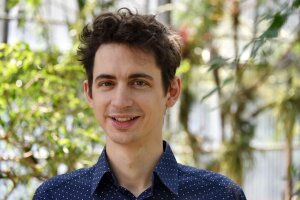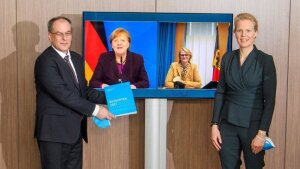News
Prof. Dr Dietmar Gallistl received the ERC Starting Grant in 2020.
Image: Anne Günther (University of Jena)New algorithms through discretisation
ERC starting grant for Jena mathematician
Every year, the European Research Council (ERC) awards starting grants to young scientists looking to carry out pioneering work in science and find answers to future questions, providing up to 1.5 million euros for them to start their own independent research group. Those who receive starting grants can run their own innovative five-year project. Prof. Dr Dietmar Gallistl (pictured above) from the University of Jena was awarded such funding in 2020. In his project entitled ›Discretization and adaptive approximation of fully nonlinear equations‹ (DAFNE), he is investigating new numerical methods for a class of differential equations in order to expand their range of potential applications.
In the years to come, Dietmar Gallistl will be examining how the ›finite element method‹ can be applied to the class of fully nonlinear equations. The finite element method is a method of discretization, a mathematical process in which a complex equation is solved by subdividing it into smaller steps. When calculating a geometrical body, for example, it is divided into many small elements. »This method is often used in engineering, for example to calculate the deformation of elastic solids,« explains Gallistl. [sh]
Exploring the ›gut-brain axis‹
The human digestive system is closely connected to the brain: Gut microbiota play an important role in mental illnesses and neurodegenerative diseases, and they also influence the brain’s ability to learn. This link is being examined more closely by the SmartAge research network led by Prof. Dr Otto W. Witte from Jena University Hospital. His interdisciplinary team of experts from ten European countries is responsible for jointly supervising 15 young researchers. The network has received almost four million euros in funding from the EU’s Horizon 2020 innovation programme. [vdG]
Research Training Group on aging to be continued
The ›ProMoAge‹ Research Training Group (RTG) has been extended for another four years. It has received a further 5.5 million euros in funding from the German Research Foundation. The group’s members come from the University of Halle-Wittenberg, the University of Jena, the university hospitals in Halle and Jena, and the Leibniz Institute on Aging in Jena (Fritz Lipmann Institute).
The funding will go towards 14 scientific projects and six medical doctorates. The main objectives of the ›ProMoAge‹ RTG are to research the post-translational modifications of cellular proteins as key factors in age progression, to explore their impact on the signal proteins relevant to aging and to investigate their influence on epigenetic and transcriptional regulatory processes. The findings can be used to improve the health of the elderly. [vdG]
Virtual submission: Prof. Dr Uwe Cantner (EFI Chair) and Prof. Dr Katharina Hölzle (Deputy Chair) present Dr Angela Merkel (Federal Chancellor) and Anja Karliczek (Research Minister) with the 2020 annual report.
Image: David AusserhoferAnnual report submitted by commission of experts
Over the past year, Germany’s research and innovation have been significantly impaired by the ongoing coronavirus crisis. This was the conclusion drawn by the Commission of Experts for Research and Innovation (EFI) in an annual report that was presented to Angela Merkel on 24 February 2021. The chancellor held a video conference with the commission and its chairman, economist Prof. Dr Uwe Cantner from the University of Jena.
In its annual report, the commission states that companies of all sizes are noting a significant drop in revenue and may be investing less in research and innovation projects. The science system is also suffering from restrictions, as reflected by research output. [sh]
Wind power: sustainable, but who does it belong to?
Image: Jan-Peter Kasper (University of Jena)Who owns the wind?
A new collaborative research centre / Transregio between the universities of Jena and Erfurt is investigating changes in ownership structures.
This new major project in Thuringia will receive around ten million euros in funding from the German Research Foundation over the next four years. The CRC ›Structural Change in Ownership‹ brings together researchers from the social, legal, economic and historical sciences.
What is it all about?
While some people’s wealth is growing faster and faster, the vast majority of the global population has to get by with less. In today’s world, 26 billionaires own as much property as the poorer half of humanity put together. »In view of the immense economic, environmental and technological challenges of our time, the concentration of wealth and resulting ownership structures are proving to be crisis-prone and highly controversial,« explains Prof. Dr Hartmut Rosa. The sociologist, who researches and teaches in Jena and Erfurt, is the spokesperson for the new CRC.
In addition to the redistribution of wealth, Rosa points out some of the other ownership issues in the modern world, such as the question of who owns the sunlight or wind used to generate and sell energy. The new research network is attempting to systematically analyse these issues and examine changes in ownership structures. Over 30 experts and their teams from both universities and associated institutions are dealing with such changes in ownership structures. [US]
What does the biological clock say?
An interdisciplinary research team from Friedrich Schiller University Jena, the Leibniz Institute on Aging (Fritz Lipmann Institute) and Jena University Hospital is being funded by the Carl Zeiss Foundation.
As the popular saying goes, ›you are as old as you feel‹—a person is not just as old as the years they have lived.
The aim of the new IMPULS research project at the University of Jena is to establish how a person’s age can be defined and determined. Over the next five years, the project team will receive around 4.5 million euros in funding from the Carl Zeiss Foundation as part of its ›Breakthroughs‹ programme.
IMPULS is the German acronym for the ›identification and manipulation of the physiological and psychological clocks in a person’s lifespan‹. In other words, the researchers are not just interested in finding out the ›time‹ displayed on a person’s biological clock. »We also want to know whether and how the overall aging process can be delayed by manipulating our biological clock,« explains Prof. Dr Christoph Englert, the spokesperson for the collaborative project. The professor of molecular genetics at the University of Jena and research group leader at the Leibniz Institute on Aging says that aging processes are modulated by individual factors, such as a person’s diet, lifestyle and attitude towards old age. »We want to combine physiological and psychological approaches to develop a new perspective on ageing.« [US]


